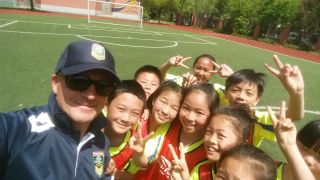Going for gold as Touch develops globally
14 Aug 2020 @ 11:45 UTC
Peter Topp, Sports Development Director at the Federation of International Touch (FIT), hosted an instructive discussion about the development of Touch recently on ‘Set of 6.’ He was joined by Tristan Mana from Queensland Touch Football, Katie Geiger from the North Queensland Touch Association, Jordan Zhu from the China Touch Association and David Parker from the Youth Development at FIT, who is based on the Gold Coast in Queensland.
Finding positives from the pandemic
The current impact of COVID-19 on Touch continues to be a leading topic for discussion, especially among those promoting the games global development.
Fortunately, there was positive news in this regard from all three Queensland based panellists, with Touch having resumed or about to resume shortly, due to the exceptionally low rates of COVID-19 transmission in the northern Australian state. The situation in China is promising as well, with China Touch Association’s Jordan Zhu noting, “Social Touch was back in late March and we are looking to host a small competition soon.”
Challenges in Development
The panel engaged is an interesting discussion regarding some of the challenges in developing Touch. This is where the different perspectives of established and developing Touch nations emerged.
The state of Queensland is a major Touch player inside Touch superpower Australia. Queensland is blessed with massive player numbers and resources, relative to most FIT members. However, it does still have challenges in further developing the sport. Katie Geiger, whose North Queensland Touch Association area is geographically enormous, noted that the large distances between towns and cities made it difficult for some players to find the time to travel to competitions and expensive to do so.
For David Parker, on the Gold Coast, “Competing against other ball sports, especially in winter”, saw a reduction in the number of junior players participating at that time of year. This problem has been rectified, according to David, by introducing shorter school term-based competitions in each of the four school terms. This has encouraged many more junior Rugby League and Football players to play Touch as well during winter. The fact that a solution to this problem was found also highlights another advantage held by established Touch nations. Australia has many experienced administrators and development officers, who can use their vast knowledge about the sport to find innovative solutions to problems.
Emerging challenges
The challenges in developing Touch in the emerging FIT member nations are different. “China has a short history in Touch Football,” Jordan Zhu said. As a new sport in China, there are fewer adult player numbers, less resources generally, a lack of local coaches and administrators, as well as less children playing Touch.
Tristan Mana has been involved in the development of coaching in Australia, New Zealand and the USA, and noted that all newer Touch nations, “Need to get senior players off the field and becoming coaches.” USA Touch Rugby has embraced this concept by adopting the goal of having no offshore coaches by 2023.
Olympic and World Cup ambition
Each member nation of FIT are at different points on the development clock, but that is not getting in the way of Olympic or World Cup dreams. The reality, however, is that participation numbers, financial resources, coaching and refereeing expertise as well as cultural exposure to ball sports must be addressed as part of the development of emerging nations.
As a new FIT member, the thought of a Touch juggernaut such as Australia developing its arsenal even further must be a bit terrifying but not enough to dull ambition. Jordan Zhu from China Touch Association said, “I hope Touch will become an Olympic sport.”
The possibilities of Olympic participation for the development of Touch would be immeasurable. Although there are hurdles before this dream becomes reality such as membership of Global Association of International Sports Federations.
Those obstacles aside, imagine the explosion of development around the world if Touch were to become an Olympic sport. A Touch minnow such as China immediately becomes a sleeping giant. Olympic membership is an intriguing prospect given the low contact nature of the sport, which is becoming increasingly appealing for participants as the impacts of chronic traumatic encephalopathy (CTE) are increasingly digested globally. Indeed, Jordan spoke to this point by stating that “Chinese parents tend to look for non-contact sports for their children.”
The development of Touch globally is truly a salivating prospect with even a World Cup Mens final in 2043 between China V Australia more than a dream if current levels of expansion continue.

